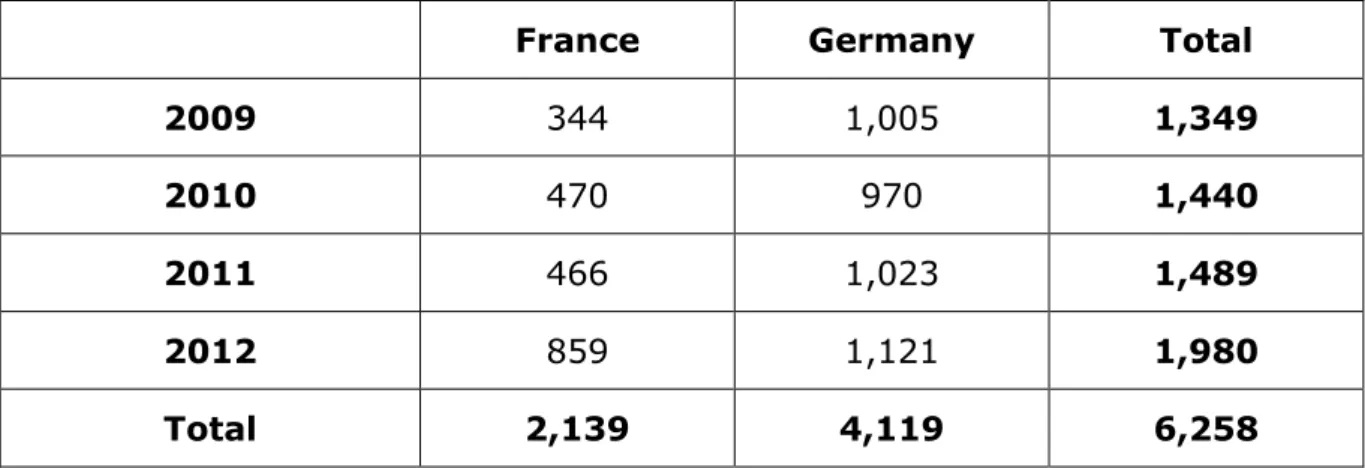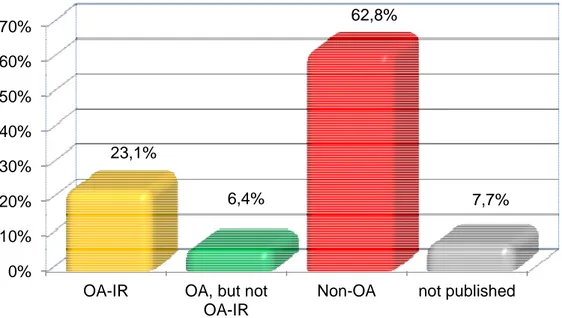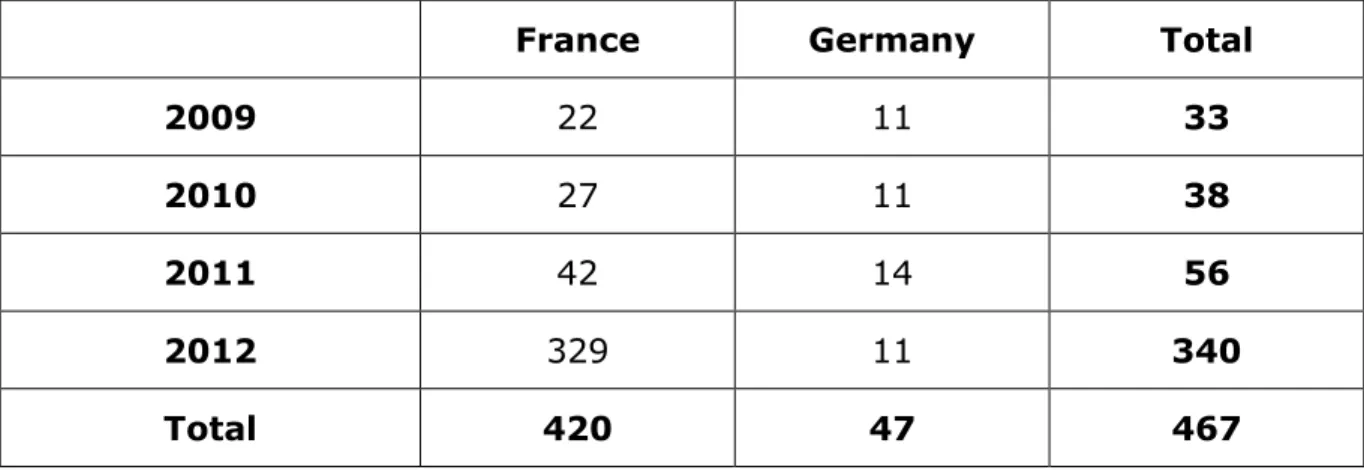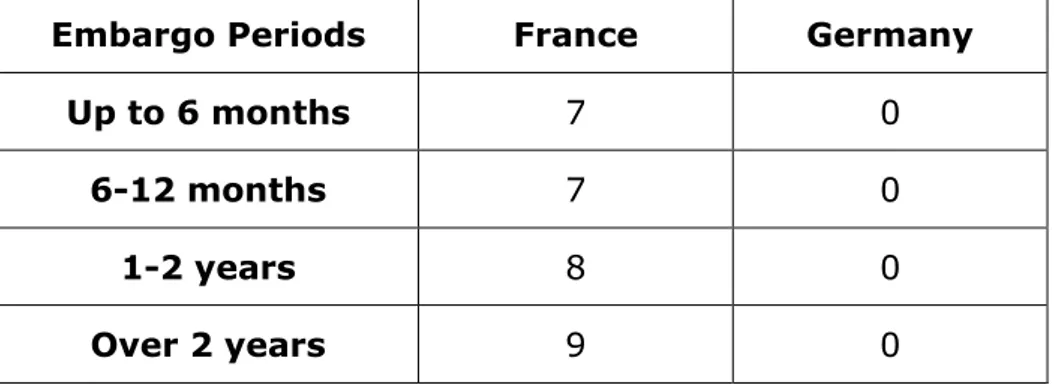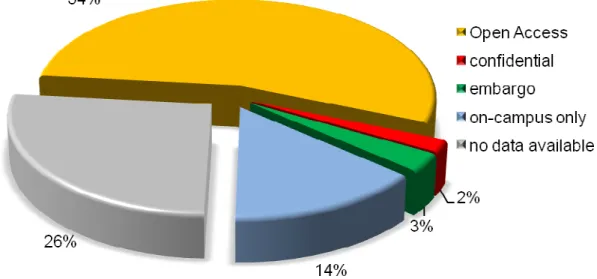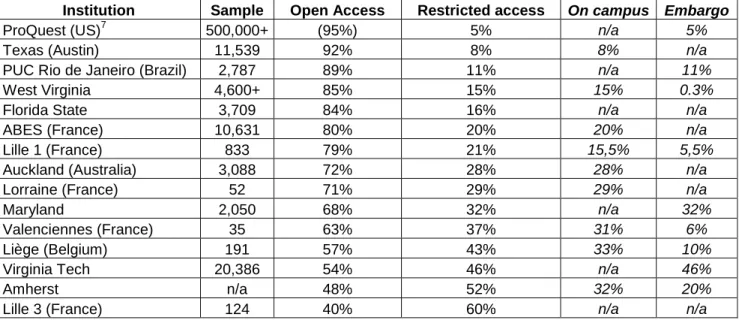HAL Id: hal-01398949
https://hal.univ-lille.fr/hal-01398949
Submitted on 5 Dec 2016HAL is a multi-disciplinary open access archive for the deposit and dissemination of sci-entific research documents, whether they are pub-lished or not. The documents may come from teaching and research institutions in France or abroad, or from public or private research centers.
L’archive ouverte pluridisciplinaire HAL, est destinée au dépôt et à la diffusion de documents scientifiques de niveau recherche, publiés ou non, émanant des établissements d’enseignement et de recherche français ou étrangers, des laboratoires publics ou privés.
A French-German Survey of Electronic Theses and
Dissertations: Access and Restrictions
Joachim Schöpfel, Hélène Prost, Marjorie Piotrowski, Eberhard Hilf, Thomas
Severiens, Paul Grabbe
To cite this version:
Joachim Schöpfel, Hélène Prost, Marjorie Piotrowski, Eberhard Hilf, Thomas Severiens, et al.. A French-German Survey of Electronic Theses and Dissertations: Access and Restrictions. D-Lib Mag-azine, Corporation for National Research Initiatives, 2015, 21 (3/4), �10.1045/march2015-schopfel�. �hal-01398949�
Electronic Theses and Dissertations: Access and Restrictions -
A French-German Survey
Joachim Schöpfel, GERiiCO laboratory at University of Lille 3, France (corresponding author)
joachim.schopfel@univ-lille3.fr ORCID 0000-0002-4000-807X
Helene Prost, CNRS, associated member of GERiiCO laboratory, France helene.prost@inist.fr
Marjorie Piotrowski, University of Lille 3 marjorie.piotrowski@laposte.net
Eberhard R. Hilf, Institute for Scientific Networking, Germany hilf@isn-oldenburg.de
ORCID 0000-0002-5910-3819
Thomas Severiens, Institute for Scientific Networking, Germany severiens@isn-oldenburg.de
ORCID 0000-0001-6303-5073
Paul Grabbe, Institute for Scientific Networking, Germany pgrabbe@isn-oldenburg.de
Acknowledgement: This paper has been prepared with funding support from the European Institute of Social Sciences and Humanities (MESHS–USR 3185), Lille, France.
Abstract
European and American studies on electronic PhD theses and dissertations (ETDs) reveal that not all of them are available in Open Access (OA). A part of the ETDs, even if not confidential, may be limited to on-campus access and/or under embargo or for other reasons not published in OA. As a French-German research team we conducted a survey with a sample of academic libraries and graduate schools in France and Germany on the situation and tendencies in ETD-publishing. The sample institutions published together 16,508 theses from 2009 until 2012.
Only 38% of these PhD theses are disseminated in digital format, as ETDs. 84% of them are OA while 5% are limited to on-campus access, 2% are under embargo and 1% are confidential. For 9%, data on accessibility are missing. The 84% OA digital theses represent 32% of all theses (print and digital). The survey reveals also qualitative and structural differences between France and Germany, especially:
France: The part of OA theses increased from 12% of the PhD theses in 2009 to 24% in 2012. There is an increase of embargoed PhD theses as enforced by the libraries, from 1% of the ETDs in 2009 to 7% in 2012. On-campus access restrictions of ETDs increased from 5% in 2009 to 28% in 2012.
Germany: The number of OA theses increased slightly from 41% of all theses in 2009 to 47% in 2012. Furthermore, very few libraries reported access restrictions. There are however some individual cases – less than 1% of all - where the author asked for restrictions because of confidential material etc.
The different policies and their results are discussed here, as well as the methodologies used. A strategy is outlined how to move on towards OA as the regular case and ETD as the only manifestation of a thesis.
1.
1.
1.
1.
Objectives
A small but growing number of European and American empirical studies on electronic PhD theses and dissertations (ETDs1) reveal figures on access and restriction (see an overview by Schöpfel & Prost 2013a). Even if not confidential, some of the ETDs are limited to on-campus access and/or are under embargo for several months or even years. An informal survey among 92 US academic libraries that mandate PhD theses to be handed in as ETDs shows that nearly all of them permit embargo periods whereas one third accept also permanent restricted availability (on-campus)2. There are different factors and reasons for this situation, such as individual choice by the author, publishing projects, or legal aspects, as seen by the library (see conceptual framework by Schöpfel & Prost 2013b).
Building on these former studies, a French-German research project (“Electronic Theses and Dissertations: Access and Restrictions”, EDAR) was launched in 2013 and 2014 by the GERiiCO Laboratory at the University of Lille 3, France and the ISN Institute for Scientific Networking at the University of Oldenburg, Germany, with funding and technical support from the European Social Sciences and Humanities Research Institute at Lille (MESHS).
Gathering empirical data on OA and restrictions to ETDs is the first objective of the survey. The aims are:
1. to collect and analyse basic information on the present status of the workflow;
2. to collect and analyse basic information with regard to acceptance, access, and local communication of the OA posting and archiving of PhD theses;
3. to collect and analyse information on the local habits and rules for handling restricted access to theses, such as embargo or on-campus-only access.
The second objective is to contribute to the preparation of an H2020 EU-project proposal trying to expand and continue this study in more EU countries, in two different ways: by collecting sound empirical data for ETD dissemination, and by testing a sampling and survey approach to be adapted to the greater scale of the planned project.
The last objective of this survey is awareness raising – awareness on access and restrictions of PhD theses in an open environment among the community of academic libraries and graduate schools. This is extended also to stakeholders, staff, policy makers and PhD students, through communication via social networks, web sites and publications.
2.
2.
2.
2.
Methodology
A small but representative sample of academic libraries and graduate schools were selected from both countries (N=60). The criteria of the sampling were:
Academic libraries:
1 In this paper, we use ETD as generic term for digital PhD theses.
2 Survey launched in 2011 by Dorothea Salo and Sarah L. Shreeves and available at
https://docs.google.com/spreadsheet/ccc?key=0AtSglIhGWCkpdHJvOUNSZUZyRC04UX RUa0w3UmgtYWc&hl=en_US#gid=0
• 15 French academic libraries were selected based on the representative sample from another research study on usage and scientific production 2013 (ELICO Lyon and GERiiCO Lille).
• The 15 German university libraries were chosen at random. Graduate Schools3:
• 15 French graduate schools (“Ecoles doctorales”) were randomly chosen by region and scientific domain. The sample covered the fields of economy and management, mathematics and exact sciences (6), social sciences and humanities (2), medicine (2), and engineering (4).
• The German sample of 15 graduation committee chairmen
(“Prüfungsausschussvorsitzende”, PAV) were selected from those 15 universities included in the library survey. Care was taken, that the 15 faculties (one from each University) were from different research fields. Thus the sample covered faculties in the fields of architecture, law, economy (2), mathematics and exact sciences (3), culture, linguistics, social sciences and humanities (2), medicine (2), and engineering.
The two questionnaires, one for libraries and one for the graduate schools were prepared in English and then translated into French and German, with slight adjustments to be compliant with the local contexts. All variants are available on the EDAR project website4.
The sample institutions were contacted by phone following an email, with some basic information about the project and a link to the EDAR project website. Moreover the email contained a link to the questionnaire on the survey platform (direct access). The survey answers were registered anonymous.
The survey took place between 16 January and 19 February, 2014.
3.
3.
3.
3.
Results
3.1.
Response rate
Summed up over both countries, 77% of the selected academic libraries answered the survey, while only 27% of the graduate schools did so.
France Germany Total
Academic Libraries 12 11 21
Graduate Schools 6 2 8
Total 18 13 31
3 The German and French graduation systems are different, with institutionalized and disciplinary graduate schools in France and ad hoc graduation committees in Germany. Yet, both are in charge of the follow-up and examination of the PhD students. We both name them here “graduate schools”.
Table 1: Number of responding entities (absolute figures, total sample=60)
For both countries together the response rate is 52%. In addition, we got a number of calls and oral responses from addressees that they would still be 'working on the answers'.
Methodologically, for the French sample, all data which were responded were entered into the analysis, thus reflecting the knowledge of the respondents on the publication channels for theses. For the German sample, only those sets of answers were used for the statistics which were complete for all the years.
3.2.
Policies
Transition from print to electronic theses
All academic libraries are handling digital and printed PhD theses in parallel.
In France, most of the academic libraries (9) reported that they use the French national archiving system STAR for their ETDs. Three say they are on the way to handle ETDs and to partially using STAR5.
In Germany, all responding academic libraries (11) reported that they use the nation-wide established framework DissOnline for their ETDs. The respondents all accept ETDs. They publish them in their institutional repositories, and use the long-term archiving service offered by the German National Library (DNB). Data are transferred into the archive making use of the defined and agreed metadata set 'XmetaDissPlus'. None of the respondents in both countries stated a policy 'ETD only', i.e. a mandatory policy, which would mean that the student must hand in his/her PhD thesis as an ETD. Such an ETD mandate has been installed and enforced already at some US universities.
Open Access and Restrictions
Summed up over the respondents from both countries, only one third, exclusively academic libraries, stated that their institution has an explicit policy with regard to OA.
France Germany Total
Academic Libraries 6 4 10
Graduate Schools 0 0 0
Total 6 4 10
Table 2: Stating some kind of OA policy (absolute figures)
5 For more information on the French STAR infrastructure see Giloux & Mauger-Perez (2008)
In France, six academic libraries reported some kind of policy in favour of OA. The other universities recommend or are in favour of OA dissemination but do not require the deposit.
In Germany, more than half (64%) of the respondents say they do not have an explicit OA policy for their university. Only 36% claimed that such a policy is implemented, meaning that they decided to increase actively the OA ratio of PhD theses.
With regard to OA policies in Germany, all libraries reported that they follow the nation-wide installed workflow scheme. This in nation-wide consent and cooperation established framework was defined and established since 1995 by the German Science Foundation funded project DissOnline: Each university accepts digital PhD theses if they are handed in, publishes them in their OA institutional repository (OA-IR), and in addition sends a digital copy for long term archiving to the German National Library DNB. In addition, the metadata of all PhD theses are preserved in the academic library catalogue even if the text is not available.
The OA institutional repositories (OA-IR) of all universities in Germany are registered by the DINI (German Initiative for NetworkInformation e.V.). In addition, the DINI workgroup e-publications serves the libraries a rich spectrum of services and gives advice for professionalizing their OA-IR. The policy of DINI is to promote and propel policies for ETDs to be OA. In addition DINI is handing out a certificate, if an OA institutional repository is compliant with a minimum set of technical, structural and administrative requirements to be a professional service, as seen to be necessary by DINI6.
In our survey here, since the answers were anonymous, we could not track which of the university library answers came from a certified OA-IR.
3.3.
Results and tendencies
Total number of PhD theses in the sample
With regard to the development of the reported total number of PhD theses over the years 2009-2012, the French and German libraries provided numbers for all years. They reported 6,961 (French) and 9,547 (German) respectively, which gives in total 16,508 theses. The data of these libraries show the following development (table 3):
France Germany Total
2009 1,726 2,425 4,151
2010 1,661 2,367 4,028
2011 1,683 2,369 4,052
2012 1,891 2,386 4,277
6 English version available at http://edoc.hu-berlin.de/series/dini-schriften/2010-3-en/PDF/dini-zertifikat-2010-3-en.pdf For French readers, see Schöpfel & Müller (2013)
Total 6,961 9,547 16,508
Table 3: Number of PhD theses in the sample (library data, all types, 2009-2012)
In both countries the total number of PhD theses per year did not change significantly over the years 2009-2012.
Number of electronic PhD theses (ETDs)
The number of ETDs as a subset of all PhD theses, as summed up over the responses from the French and German libraries was in total 6,258 ETDs, slightly rising over the years (table 4).
France Germany Total
2009 344 1,005 1,349
2010 470 970 1,440
2011 466 1,023 1,489
2012 859 1,121 1,980
Total 2,139 4,119 6,258
Table 4: Number of digital PhD theses (ETDs) in the sample (library data, only ETD, 2009-2012)
Digital theses represent 38% of the whole sample. Yet, there are two differences: The German part (43%) is higher than the French (31%).
In both countries, the part of ETDs increased steadily from 2009 to 2012. In France, the percentage increased from 20% to 45%. In Germany, the ETDs show a growth from 41% to 47%.
In Germany the libraries answered to the question by the numbers they control, i.e. the number of ETDs deposited in their institutional repository (IR). But not all ETDs theses are listed in the library’s repositories. Thus the numbers reported in their figures may be an underestimate. For an example, we examined the chosen publishing channels for PhD theses at the Faculty for Art and Humanities at the University of Paderborn (figure 1):
0% 10% 20% 30% 40% 50% 60% 70%
OA-IR OA, but not OA-IR
Non-OA not published 23,1%
6,4%
62,8%
7,7%
Figure 1: Publishing channels of PhD theses of the Faculty of Arts and Humanities, Paderborn over the years 2009-2012 (in percent), N=78
Regarding OA PhD theses, as part of all ETDs, figure 1 indicates that a small portion of theses, which are published OA, are not listed in the library institutional repositories, but published elsewhere online. The chart also reveals that in arts and humanities, OA is much less popular than for instance in the exact sciences.
ETDs in Open Access
How many PhD theses are OA? Due to embargo measures and restrictions, not all ETDs are freely available via OA. The libraries reported, summed up over the years 2009 to 2012, 1,165 (French), 4,072 (German), and in total 5,237 PhD theses to be OA (table 5).
France Germany Total
2009 207 994 1,201
2010 298 959 1,257
2011 213 1,009 1,222
2012 447 1,110 1,557
Total 1,165 4,072 5,237
Table 5: Number of digital PhD theses published OA (library data, ETDs in OA, 2009-2012)
digital theses (ETDs). Two observations may be of interest:
There is at present a significant difference between France and Germany. While in France, the part of OA theses between 2009 and 2012 is 17%, the German libraries reported 43%. Another difference is the percentage of OA theses compared to all ETDs. Here, the part in France is 54% while nearly all German ETDs are reported as OA (99%). The probable reason for this difference was already mentioned above: obviously the German libraries only reported the figures from their institutional repository where virtually all ETDs are OA; but again, not all ETDs theses are disseminated via the library-hosted repositories.
Also, the part of French OA digital theses doubled between 2009 and 2012, from 12% to 24% of all theses. Yet, when compared to the ETDs, the part of OA decreased from 60% to 52%, i.e. that the part of restricted access increased. In Germany, the part of OA theses compared to all theses increased slightly from 41% to 47%, while the part of OA theses of all reported ETDs remains stable on a high level (99%, see above).
Theses with restricted or no access
Not all digital PhD theses (ETDs) are OA due to embargo periods, on-campus restrictions or for containing confidential material.
Regarding the development of reported non-OA PhD theses, compared to all reported ETDs, French and German libraries reported 420 (French), 47 (German), and in total 467 theses to be non-OA (table 6).
France Germany Total
2009 22 11 33
2010 27 11 38
2011 42 14 56
2012 329 11 340
Total 420 47 467
Table 6: Number of digital PhD theses with restricted or no access (library data, ETD not OA, 2009-2012)
The overall number of PhD theses with restricted or no access is 3% - 6% of all theses in France (print and electronic) and close to 0% in Germany. These figures must be interpreted carefully because for 26% of all ETDs, the French libraries did not qualify the status regarding OA while for reasons indicated above (answers limited to
institutional repositories) German libraries posted nearly all of their ETDs as “OA”. However, the figures show that in France, the part of PhD theses with restricted or no access increased, from 1% in 2009 to 17% in 2012 in particular.
part of their policy. Over the four years less than 2% of ETDs are subject to restrictions, and only as and when requested by the author. That means that at least 98% of the reported ETDs are OA. There are no recordings of their ETDs and OA/non-OA status for PhD theses which are not sent to the university institutional repository which in Germany is as much as about 50%.
3.4.
Access Restrictions
How do universities handle access restrictions? Do they? And if so, in which way? Only academic libraries answered these questions, and French and German libraries answered in a quite different way.
With regard to embargoes and restrictions, we distinguish 'embargo and restrictions' as enforced by the Library as their policy, and restrictions as requested by the author for e.g. confidential matter reasons.
In France, except one, all academic libraries reported that they accept and can handle on-campus-only access, i.e. restricted access limited to the intranet or workspace. Also, 75% of them manage embargo periods, ranging from six months to more than two years. Only one library said that they did not allow access restrictions (table 7).
Embargo Periods France Germany
Up to 6 months 7 0
6-12 months 7 0
1-2 years 8 0
Over 2 years 9 0
Table 7: Offered embargo periods reported by the libraries
German libraries answered that they do not impose or handle any restrictions or embargoes as part of their policy.
Table 8 distinguishes between three types of access restrictions, as reported by the libraries: confidential theses (no access), embargoed theses, and theses with restricted access limited to the campus (Intranet). Overall, the on-campus limitation represents 65% of all access restrictions, compared to 25% for embargoes and 10% for confidentiality. But again, the differences between both countries are significant.
France Germany Total
Confidential 47 0 47
On-Campus 304 0 304
Total 420 47 467
Table 8: Number of digital PhD theses with restricted or no access, per type of restriction (library data, ETD not OA, 2009-2012)
Figure 2 shows the distribution of access restriction related to the overall number of digital theses. While 84% of ETDs are freely available (OA), 5% are limited to on-campus access, 2% are under embargo and 1% are confidential. For 9%, data on accessibility are missing.
84% 1% 2% 5% 9% Open Access confidential embargo on-campus only no data available
Figure 2: Openness and accessibility of ETDs (both countries, 2009-2012)
The differences between the French and German samples are significant. For the same data but limited to France (figure 3) only 54% ETDs are freely available. 14% are available only on the campus or via Intranet, 3% are embargoed and 2% are confidential. For 26% data are missing.
Figure 3: Openness and accessibility of ETDs (only France, 2009-2012)
Because of the small sample size, these differences should not be over-interpreted. Yet, a future survey should be sensitive about this kind of country-specific differences.
Tendencies of access restrictions
The figures for Germany remained stable over the surveyed period. With regard to embargoes and on-campus-only-access restrictions, only two of the libraries declared a 'yes', but then in the comment they stated that they only practise this if the candidate asked for. They mention that there have been only very few (less than 1%) cases. The German university libraries do not impose or suggest on-campus-restrictions or embargoes on their own. Embargoes or restrictions (on-campus-only) are to be applied only for individual cases on request by the student (less than 1%).
In France, the part of confidential ETDs remains stable around 2% while the percentage of embargoes and on-campus access restrictions increased between 2009 and 2012, from 1% to 7% (embargo) and from 5% to 28% (on-campus).
3.5.
Synthesis
France
• The part of OA theses compared to all theses increased from 12% of the PhD theses in 2009 to 24% of the PhD theses in 2012.
• There is an increase of embargoed PhD theses, from 1% of the ETDs in 2009 to 7% in 2012.
• On-campus access restrictions of ETDs increased from 5% in 2009 to 28% in 2012.
Germany
• The number of OA PhD theses increased from 41% of all PhD theses in 2009 to 47% in 2012.
• Furthermore, in Germany, very few libraries reported access restrictions. There are however some individual cases where the author asked for restrictions because of confidential material etc. These cases are in total less than 1% of the total.
3.6.
Education and Assistance
Roughly half of the academic libraries declare that they offer regular training classes and information material for the technical preparation of a thesis.
France Germany Total
Academic Libraries 8 6 14
Graduate Schools 0 0 0
Total 8 6 14
Table 9: Training and education on ETDs (absolute figures)
This education and assistance include legal aspects such as restrictions and embargo. Only academic libraries appear to be concerned and engaged, while at least in our sample, graduate schools do not offer such service so far for their PhD students.
4.
4.
4.
4.
Discussion
4.1.
Methodological shortfalls
The overall response rate of the questionnaire was 52% - thus satisfying for an online survey but to be seen with caution because of the small sample size and because of the nearly complete lack of exploitable answers from French graduate schools and German graduation committees.
There may be a bias in that especially libraries which are more active in the field of OA and digital PhD theses did more likely answer the questionnaire.
Also, the absolute figures on OA ETDs are probably an underestimate because especially the German libraries may have misunderstood the question, providing figures only from their institutional repository without figures on digital theses which are not in their own repository. This means too, that probably the percentage of OA PhD theses in the EDAR survey may be an underestimate because other OA-services of dissemination and preservation are not recorded by the Library (e.g. OA-journals, international research field specific archives, Institute/Graduate School server etc.).
For the analysis of the responses by the libraries we resorted to two different strategies: we analyzed all numbers as reported by the libraries of a country (France). Thus the results reflect the present knowledge of the librarians who responded, which proved to be quite incomplete.
Alternatively we picked only those responses which gave complete numbers for all years asked and which we trusted (excluding the one where the total number of PhD was given to be lower than its portion of ETDs). This however reduced drastically the dataset and increased the bias that these are those few universities with the most engaged and knowledgeable librarians, and not just a good average estimate over all universities (Germany).
A future survey will have to be non-anonymous to allow for asking back, and for checking and researching to complete, correct, and check the locally known numbers.
4.2.
Comparison with former empirical evidence
Compared to our 2013 review on access restrictions, the survey data appear consistent and comparable.
Institution Sample Open Access Restricted access On campus Embargo
ProQuest (US)7 500,000+ (95%) 5% n/a 5%
Texas (Austin) 11,539 92% 8% 8% n/a
PUC Rio de Janeiro (Brazil) 2,787 89% 11% n/a 11%
West Virginia 4,600+ 85% 15% 15% 0.3%
Florida State 3,709 84% 16% n/a n/a
ABES (France) 10,631 80% 20% 20% n/a
Lille 1 (France) 833 79% 21% 15,5% 5,5%
Auckland (Australia) 3,088 72% 28% 28% n/a
Lorraine (France) 52 71% 29% 29% n/a
Maryland 2,050 68% 32% n/a 32%
Valenciennes (France) 35 63% 37% 31% 6%
Liège (Belgium) 191 57% 43% 33% 10%
Virginia Tech 20,386 54% 46% n/a 46%
Amherst n/a 48% 52% 32% 20%
Lille 3 (France) 124 40% 60% n/a n/a
Table 10: Review of former studies and selected repositories (from Schöpfel & Prost 2013b)
In particular, the following features seem consistent:
• Large differences of openness between institutions, ranging from 40% to 92% of all deposited theses in France; in Germany 98% of deposited theses are OA. This
7 ProQuest: In 2012, ProQuest conducted a study on ten years embargo trends (2000-2010) in the ProQuest Dissertations and Theses (PQDT) database. The surveyed corpus of 500,000+ print and electronic theses contained about 25,000 embargoed items (5%). Most of the embargoes are short-term embargoes, for six months to five years, but a small part of theses are under permanent (long term) embargo. So the
information is that 5% ETDs are embargoed; but this does not means that the other 95% are all in OA. For more details, see ProQuest (2012).
conforms to the situation in the United States, where one sees a disjunctive set of Universities: a) those with an embargo policy which yield numbers as in France, and those without, which are similar to the German numbers of rare cases.
• Without the ProQuest figures, the part of ETDs with limited access is 17%, ranging from 10% to more than 50% in France; in Germany only students have occasionally the request for restrictions or an embargo due to confidential etc. material. This is a 1% rate.
• Data on specific forms of access restrictions (embargo, intranet) are often missing or incomplete. In France, 17% are embargoed for six months to two years or longer (EDAR survey 3%) while the other 9% can only be accessed on-campus (EDAR survey 14%).
• In Germany, all PhD theses must be registered at the university library, but only those which are handed in as ETDs are archived at the local OA-IR. There may be more being published through other channels.
4.3.
Libraries and graduation committees: the German situation
At least in our sample, the academic libraries appear to be more interested and competent in OA than graduate schools or committees (PA) which are officially not directly concerned with regard to the processing and dissemination of PhD theses. They do not control and/or follow-up document processing statistics (and do not communicate between each other about the topic). Even if individual members of a graduate school or committee may express personal attitudes on OA, no significant institutional opinion or policy can be identified. Sometimes, their information may be simply misleading. For instance, one respondent stated that “all dissertations of my faculty are of course fully OA. Anything else would not make sense nowadays.” However, the analysis of the institutional repository’s statistics revealed that the real number of OA theses is only 50% of all, which means that this PA does not know the candidates’ decisions.
On the other hand, academic libraries are directly concerned with the preservation and dissemination of PhD theses. They were responsive, and they provided at least partial figures on the processing of PhD theses. But they do not control all aspects, do not keep exhaustive statistics of key elements (such as embargo), some figures are missing, were not conserved, are not (no longer) available or were simply not communicated.
The general impression is contradictory: In general, respondents appear in favour of OA. But the survey reveals a lack of awareness and also, at least partially missing follow-up of the candidates publishing decisions.
One of the major concerns of both institutions is with legal compliance and, especially in Germany, plagiarism. Their global approach appears to be risk avoidance with regard to intellectual and industrial property rights.
The German copyright law “Urheberrecht” is in contrast to the Anglo-Saxon legislation a security right of the creator covering his/her creations. This gives full legal freedom to the candidate in decision of the publication channel. He/she has to prove to the university that the thesis has been published. Thus the author is the one who has to care to get his/her thesis published; the publication channel is his/her very own choice. He/she can send either several print-copies to the local university library and to a publisher for print publication or he/she can send an electronic copy to the university
library for publishing in its OA institutional repository (OA-IR), or can publish the thesis elsewhere online.
If the work is published, the library reports to the graduation committee the 'has been published' note. The graduation committee then issues the permission to the candidate to use the title 'Dr'.
4.4.
Bottlenecks
The EDAR pre-study exhibited three major deficiencies or obstacles towards a more professional policy regarding OA of digital PhD theses in Germany:
1. Lacking contact and information (including material and education) between the stakeholders, i.e. university library, PA staff member, PhD candidate.
2. A mismatch between the persons in charge and the persons to bear the consequences: the candidate has the exclusive right to decide the publication channel, OA or not. The PA staff is not responsible for the dissemination of the thesis, their implication is only temporary and may therefore lack interest and knowledge about copyright, restrictions, patent law, digital publication channels, OA initiative, technical requirements for ETDs (metadata standards, interoperability, long term archiving etc.), and full re-use of the scientific content for other research.
3. A lack of sharing, networking and exchange of experience (virtual community) between professionals, PA staff and the PhD students.
Whereas in France, the problem can be described on three different levels:
1. Transition from print to digital: libraries and graduate schools are still in the transition, handling both print and digital versions. This may at least partly explain little experience and lacking statistics.
2. A strong protection by intellectual property law: While administrative law allows for on-campus dissemination without authorization (OA to administrative documents), larger digital dissemination is not possible without formal permission by the PhD student. This contributes to a high rate of access restriction and on-campus (intranet) availability and explains why French universities with their academic libraries in charge of the dissemination of PhD theses must necessarily find solutions between no access at all and free (open) access.
3. Lack of collaboration between graduate schools and academic libraries: At least for this aspect, both institutions are rarely working together or coordinate their action regarding OA and dissemination of ETDs. One reason may be that French academic libraries are closely related to their university while graduate schools may depend on different universities, with more than one graduate school on the same campus.
5.
5.
5.
5.
Conclusion
Open, digital science is on the agenda of the European Union. In the European Research Area and beyond, researchers, scientific knowledge and technology should circulate freely, through cooperation both between the Union and the Member States, and among the Member States, in particular through the application of a coherent set of rules. OA to scientific publications and research data is part of this policy.
The EDAR survey confirms former empirical evidence on restricted access to ETDs, especially because of embargo periods and on-campus availability. Obviously, there is no need for new facilities and infrastructures on local, national or European levels. Today, the problem of OA to ETDs lies upstream in local contexts that facilitate decisions in favour of embargoes or restricted access (on-campus access, intranet). To put it in a simple way, pipes exist, but it lacks the fuel and the pressure for ETDs and OA.
The percentage of OA theses varies depending on the country, the research field and the institution. To increase this percentage is a problem on many levels, technical (workflow) as well as legal, administrative (regulatory), tradition, and ethics. What is needed is better understanding of the situation and awareness raising, lobbying at the national and European policy level, a comprehensive communication net both for candidates as well as for the responsible local staff, making use of current training material.
Future research should produce and disseminate more reliable and consistent empirical data on the processing of electronic theses and dissertations (ETDs) in a wide set of European countries with their different infrastructures and legal environments, in particular to address the problems and variations of access restrictions. It should in this way contribute to a better coordination of OA policies regarding ETDs in the European Research Area and beyond it to build a sustainable community focussing on the OA of research theses.
6.
6.
6.
6.
Bibliography
M. Giloux & I. Mauger-Perez (2008). `A new French circuit for the electronic theses'. In ETD 2008 11th International Symposium on Electronic Theses and Dissertations, 4 - 7 June 2008, The Robert Gordon University, Aberdeen, UK.
http://www4.rgu.ac.uk/etd/programme/page.cfm?pge=45696
M.A. Gonçalves, R.K. France, E.A. Fox, E.R. Hilf, M. Hohlfeld, K. Zimmermann & T. Severiens (2001). ‘Flexible Interoperability in a Federated Digital Library of Theses and Dissertations’. Proceedings of the 20th World Conference on Open Learning and Distance Education, "The Future of Learning - Learning for the Future: Shaping the Transition”, ICDE2001, Düsseldorf, Germany, 01 - 05 April 2001
http://citeseerx.ist.psu.edu/viewdoc/download?doi=10.1.1.25.2857&rep=rep1&type=p df
E.R. Hilf & T. Severiens (2013). 'Was macht die Dissertationen-Online Diskussion in Deutschland?'
http://www.isn-oldenburg.de/blogs/eberhard-r-hilf/2013/01/dissonline
ProQuest (2012). ‘Ten year embargo trends.’ In CGS Summer Workshop and New Deans Institute, Boston, Massachusetts, July 7 – July 11, 2012.
J. Schöpfel & U. Müller (2014). `Evaluer la qualité des archives ouvertes: Le certificat DINI'. Partnership 9(1):1-21.
https://journal.lib.uoguelph.ca/index.php/perj/article/view/2733/3226
J. Schöpfel & H. Prost (2013a). `Degrees of Secrecy in an Open Environment. The Case of Electronic Theses and Dissertations'. ESSACHESS - Journal for Communication Studies 6, 2(12).
http://www.essachess.com/index.php/jcs/article/view/214
J. Schöpfel & H. Prost (2013b). `Back to Grey. Disclosure and Concealment of Electronic Theses and Dissertations'. In GL15 Fifteenth International Conference on Grey Literature. The Grey Audit: A Field Assessment in Grey Literature. CVTI SR, Bratislava, Slovak Republic, 2-3 December 2013.

